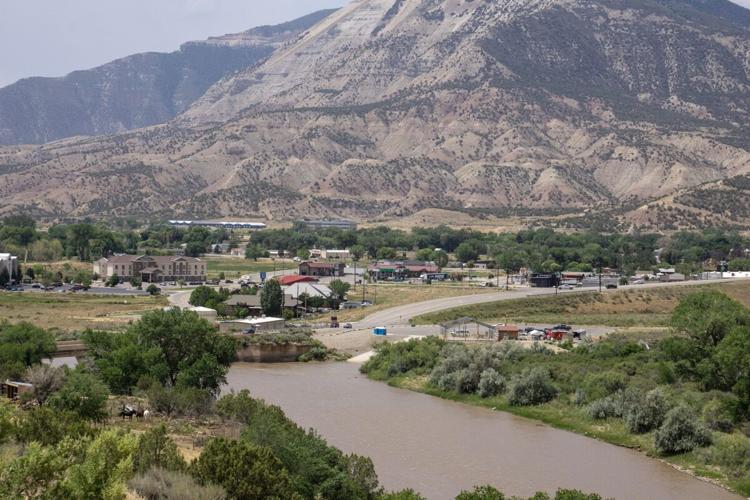It’s midnight outside of the Grand River Hotel in south Parachute. It would be quiet if not for chirping crickets in a field next to the Colorado River and a freight train roaring along the tracks next to Interstate 70.
County: Garfield
A sudden wind provides some respite from the high humidity. The scene is a stark contrast from the town’s bustling daytime atmosphere, consisting of cars moving in and out of several gas stations on both sides of the interstate; hotel guests shuffling between rooms and their vehicles or walking their dogs; locals and visitors popping into the small businesses on East First Street or Cardinal Way; and semi-trucks exiting the interstate as their drivers park and stop for a quick bite or a mandated rest.
The central Garfield County town, located in the Grand Valley midway between Rifle and Palisade, has 1,124 residents based on the 2020 census. It also has more than two “official” mottos: “Western Gateway to the Rockies” and “A Safe Place to Land.” More than one local resident describes the community as “easy-peasy.”
A center for the oil and gas industry in the late 1970s and early 1980s, Parachute has taken steps to diversify in recent years given that fossil-fuel activity is a shadow of its former self. Few would disagree that the legalization of marijuana and the resulting sales-tax revenue from multiple dispensaries has helped to keep the town afloat financially. The town also is growing its outdoor recreational offerings through the municipally operated TOP Adventures, which rents off-highway vehicles for use on nearby trails, and tubes, rafts and kayaks for a 6-mile stretch of the river, which flows along the south side of town.

Michael Satterfield, left, and Connor Ostermiller, employees of TOP Adventures, carry a kayak next to the newly constructed framework for a storage facility. TOP stands for Town of Parachute.
In addition, the area has become a housing destination for workers in the region — including those with jobs in the Roaring Fork Valley — because of availability and affordability: a two-bedroom apartment with a full kitchen can be rented in the vicinity of $900 per month, considerably less expensive than similar residential offerings between Glenwood Springs and Aspen. Construction workers and others with good-paying jobs often carpool for the 90-minute, one-way trek to the Aspen area; they make it feasible.
Like many rural communities along the Western Slope that are not ski destinations, Parachute is politically conservative, which may seem to be at odds with its financial embrace of the marijuana industry. But the town’s demographics have been changing, with many young families moving into houses formerly occupied by retirees and Latino entrepreneurs starting businesses and making their presence known in the small community.
“There’s a propensity for people to say that Parachute is the ‘marijuana capital’ of western Colorado,” Mayor Roy McClung said Saturday. “We’re a lot more than that — we’re not that and I wouldn’t want us to be known for that.”
‘An economic decision’
While Parachute is about many things other than the numerous and legal products that come from a leafy green plant with medicinal and mind-calming properties, there’s no denying the impact of pot-related sales on the town’s coffers.
McClung said 32-37% of Parachute’s operating budget is covered by sales-tax revenue from six dispensaries currently operating: Buds, Green Joint, High Q, Kind Castle, Tokin Tipi and Tumbleweed.

Tumbleweed Dispensary is located in south Parachute near a liquor store and a few fast-food establishments.
Town Manager Stephen McArthur said Parachute didn’t move quickly to allow pot shops after state voters approved recreational marijuana in 2012. It happened a few years later, well after Glenwood Springs and Aspen put into place regulations that allowed dispensaries to open.
He said natural gas activity was slowing down dramatically around 2014-15, and as a result, the town was staring at declining tax revenues and potential budget shortfalls.
“The town had to do something,” McArthur explained. “It became an economic decision.”
Sales-tax revenue was more than $1 million in 2014 and fell to about $800,000 in 2015. An even greater decline was forecast for future years. The Parachute Town Council held discussions on the issue and adopted an ordinance to allow recreational marijuana dispensaries.
Stores opened in 2016, and by 2018, the town’s sales-tax revenue grew to $1.5 million. In 2019 and 2020, revenue was flat but consistent at $1.8 million, despite the onset of the pandemic in 2020. Revenue this year is estimated at $1.9 million. (McClung said another reason sales-tax revenue last year stayed solid was due to increased online retail purchases during the months that followed the onset of the pandemic.)
The town did not set a cap on the number of marijuana purveyors that could operate, preferring to let the market decide the number. However, council members recently set into place a moratorium on dispensaries in order to “slow things down,” the mayor said: at least for now, no more will be allowed to open, even if an existing store should close.
“The community of Parachute itself is too small. The residents can’t support six stores,” McArthur said. Customers are primarily I-70 travelers or people coming over from Utah and Grand Junction, where in the case of the former, pot shops are still outlawed, and in the latter, nonexistent.
McClung spoke of how there was no serious opposition to the ordinance allowing dispensaries until after council approved it.
“During the government process, the council asked for public input [on the question of dispensaries],” he said. “We didn’t get any. The process worked the way it was supposed to work.”
Then, somewhat suddenly, a vocal minority sprouted, opposing the move toward marijuana. Based on the council’s action, they started a recall process of the town’s elected officials. That was in 2016, when one dispensary was already open and two more were in the works.
The community spoke, McClung said, and by a wide margin, the recall effort failed. Once the shops opened, the criticism died down, “when people saw that the [cannabis industry] did what it said it was going to do.”
Marijuana has not had any major negative impacts on Parachute, the mayor and the town manager both said. All of the stores have high-tech security systems, making it easy to catch would-be thieves. Contacts with local police have risen, but McClung believes that would have happened anyway with statewide legalization and the opening of stores in nearby Glenwood Springs, Silt and De Beque.
While McClung stresses that Parachute is much more than a destination for cannabis aficionados, McArthur points to the positive aspect of allowing dispensaries to open.
In terms of sales-tax revenue, “Marijuana saved us,” McArthur said.
Keeping it calm
It’s a little slow at lunchtime Friday at Nalini’s Restaurant, a small eatery on East First Street, which serves as the main thoroughfare on Parachute’s northern side. Nalini’s specializes in Mexican and Salvadoran dishes and is owned by Margarita Garcia and her son Luis.

Margarita Garcia, owner-operator of Nalini’s Restaurant on East First Street, says she prefers the small-town life afforded by Parachute.
Margarita moved to Parachute a decade ago from northern Utah to join her sons, who were already in Garfield County and working when the oil and gas economy was better. She worked for a La-Z-Boy factory in Tremonton until its closure in 2008. More than 600 people were laid off.
She opened Nalini’s six years ago with help from one of her sons, Luis. She’s worked in restaurants, off and on, most of her life.
Margarita said she likes Parachute and that business is OK.
“It’s a little town that’s very good for living. I don’t like the big cities,” she said.
Compared with 2020 and the first months of the pandemic, “business is much better,” she added.
Luis chimed in.
“I would say business is good just because we haven’t stopped. We haven’t made a lot of money; this is a small town,” he said.
It’s a low-tech operation. Marketing is handled by word-of-mouth. Margarita’s grandkids help out when needed.
“We just try to be, like, old school,” Luis said.
In addition to being a restaurant, Nalini’s is taking on catering jobs. Luis said he is proud of the positive Yelp reviews the restaurant has been getting.
He explained that several years ago, he tried to give Margarita money for a house, but she wanted to buy a business instead. That’s when Nalini’s was born.
Parachute is a laid-back place to live, Luis said. Most everybody is friendly.
“I feel like everybody around us, we all see each other all the time and wave, we all know we work hard. People like to have a little beer after work, maybe their joints. We keep it calm here; it’s nothing too rowdy,” he said.
Parachute lacks nightlife, but the town doesn’t necessarily need it. “People can go to Grand Junction or Glenwood Springs for that,” Luis said. “We’re all working folk down here, I guess you can say.”
Just a stone’s throw away from Nalini’s, some empty storefronts are visible. In the same area, a thrift shop for the regional nonprofit Lift-Up recently was converted into a distribution facility.
Debbie Patrick, marketing director for Lift-Up, said the thrift shop and an adjacent food pantry in Parachute were closed at the onset of the pandemic — in fact, Lift-Up closed all of its pantries in the region, including the Aspen site.

What formerly was a Lift-Up Thrift Shop on East First Street is now a distribution warehouse for the regional nonprofit.
Facing a 600% increase in demand for food, and given the social distancing requirements, the nonprofit shifted all of its food distribution operations to drive-up locations.
“We had to convert the Parachute thrift store building into a warehouse,” Patrick said. “We use that facility to bring in all of our perishable and nonperishable food and for all of our bag packing. Right now, we still are doing mobile distributions in Parachute, and we are in the process of reopening [permanent] pantries in other locations.”
Plans call for continuing mobile food distribution in Parachute, however.
“Right now, because we need the building for the warehouse, we won’t reopen the pantry [or the thrift store] in Parachute,” she said, adding that the thrift store in Rifle, 17 miles away, reopened in June.
People in need in Parachute can receive food distribution on the second and fourth Fridays of the month from 4 to 6 p.m., next to the former thrift store building on East Street. Food also will be distributed on the third Saturday of the month from 12 to 2 p.m.
Patrick explained that while a need for food distribution still exists, things have calmed down since the pandemic’s first year. Lift-Up is serving about 128 families per month in Parachute, a marked decrease from assisting more than 300 families a month in the first quarter of 2021.
The nonprofit, she said, is looking to establish a “mobile pantry of choice” in Parachute next year. That way, customers won’t just be handed a prepackaged bundle of goods, which is the process at the mobile locations in Parachute and elsewhere. They’ll be able to pick and choose the foods they want, just as they would at the former brick-and-mortar location.
‘From Aspen to Parachute’
In the upper Roaring Fork Valley, nonprofit operators and government officials have been fond of using the phrase “from Aspen to Parachute” when describing the regional effort to assist communities with everything from homelessness to mental health services to day care to infrastructure improvements.
Mayor McClung said the phrase expresses “some good intent,” but added that upper valley officials don’t really understand Parachute or its needs. While the town does need federal grant assistance with its water and sewerage infrastructure, homelessness is not a huge problem in Parachute like it is in the Aspen area or Glenwood Springs, he said. The lack of affordable child care, too, is more of an Aspen-to-Basalt problem, he pointed out.
Parachute has a health care facility, Grand River Health’s clinic in nearby Battlement Mesa, McClung noted. Grand River also has a hospital in nearby Rifle.
Battlement Mesa, an unincorporated community governed by Garfield County, borders Parachute to the southeast and features an 18-hole golf course, a few businesses (including Clark’s Market) and many affordable homes and apartments. Between the housing in Parachute and Battlement Mesa, there’s not a huge housing crunch like there is in the Roaring Fork Valley.
“Although it is starting to get a little tighter,” McClung admitted.
He said he has nothing against regional efforts aimed at bettering communities, but added that he’d love for Roaring Fork Valley officials to visit the Grand Valley to actually witness firsthand what the local needs are.
“Our issues tend to be different down here in Parachute, and I don’t think the people in these think tanks really recognize that. They’re trying to find a one-size-fits-all approach, and that doesn’t really work here,” he said.
“I would love for people in Aspen to come down and see what we’ve got going on in Parachute,” the mayor continued. “Take an hour, have a burger and a cup of coffee at Shommy’s [restaurant] and see what we’re all about.”
McArthur emphasized that the TOP Adventures recreational initiative, along with tax breaks and other incentives designed to lure more businesses to Parachute, signal a strong desire to diversify and make the town stronger. He noted that a Love’s Travel Stop will be built next year in a vacant field next to the boat-ramp area where TOP Adventures is currently growing its operation.
The town also is buying property to create more trails, he said, with the hope of luring more visitors from inside and outside the state to enjoy Parachute’s recreational offerings.
Of the “Aspen to Parachute” phrase, McArthur echoed Mayor McClung by saying that it doesn’t hurt to have regional assistance, but that day care and homelessness may be Roaring Fork Valley issues.
“Our focus really has just been on trying to keep the town alive,” McArthur said.









